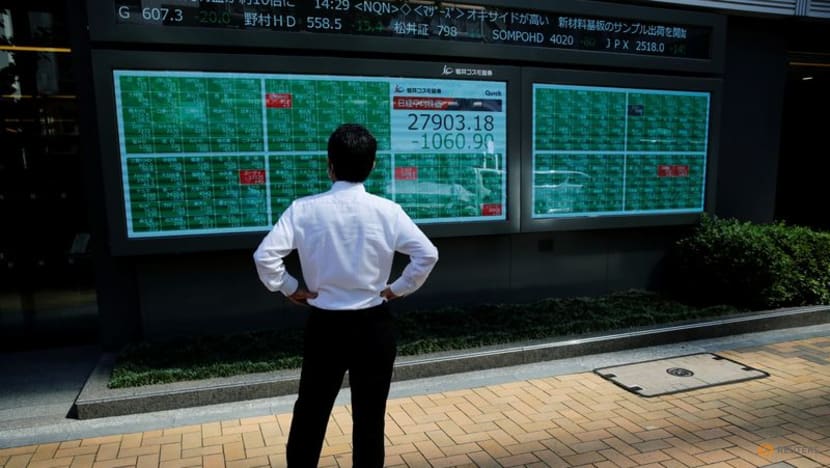Asia shares fall as investors eye rising COVID-19 cases, Afghan crisis

Asian shares declined in early trade on Tuesday as growing anxiety over the spike in the Delta variant of COVID-19 infections and turmoil in Afghanistan eclipsed overnight strength on Wall Street.
The continued spread of new COVID-19 variants and the impact on the global economy have shaken market confidence, with traders looking out for earnings reports from major retailers due later in the week.
Investors were also watching news from Afghanistan, where thousands of civilians desperate to flee the country thronged Kabul airport after the Taliban seized the capital and declared the war against foreign and local forces over.
"Disappointing Chinese economic data, anxiety over developments in Afghanistan, concerns over the impacts of the Delta variant, and a steeper-than-expected pull-back in the NY Empire State manufacturing index weighed on risk appetite, boosting safe haven demand," analysts at ANZ said in a note.
Early in the Asian trading day, MSCI's broadest index of Asia-Pacific shares outside Japan was down 0.4per cent while U.S. stock futures, the S&P 500 e-minis, were down 0.18per cent.
Australian shares fell 0.75per cent, although Japan's Nikkei stock index edged up 0.22per cent.
China's blue-chip CSI300 index dipped 0.18per cent in early trade, while Hong Kong's Hang Seng index opened down 0.4per cent.
Wall Street rebounded on Monday, pushing up two of its three major indices, with the benchmark S&P 500 and the Dow industrials hitting record highs, as investors moved into defensive sectors and stocks recovered from initial losses.
The Dow Jones Industrial Average and the S&P 500 rose 0.31per cent and 0.26per cent, respectively. The tech-heavy Nasdaq Composite slipped 0.2per cent.
Tesla shares fell 4.3per cent after U.S. auto safety regulators said they had opened a formal safety probe into the company's driver assistance system Autopilot after a series of crashes involving emergency vehicles.
A raft of Chinese data on Monday showed a surprisingly sharp slowdown in the world's second-largest economy, while the New York Federal Reserve's Empire State barometer of manufacturing business activity fell more than expected.
Investors are focused on when the Federal Reserve will rein in its easy money policies, with minutes from the central bank's latest meeting due on Wednesday.
Boston Federal Reserve Bank President Eric Rosengren said on Monday that one more month of strong job gains could satisfy the U.S. central bank's requirements for beginning to reduce its monthly asset purchases.
The dollar ticked up against a basket of six major currencies, rising 0.024per cent to 92.644 after dropping to a one-week low on Friday.
In more risk-off moves, the yield on benchmark 10-year Treasury notes fell as demand for safe-haven U.S. bonds ticked up. The yield on benchmark 10-year Treasury notes dropped to 1.255per cent compared with its U.S. close of 1.257per cent on Monday.
The two-year yield, which rises with traders' expectations of higher Fed fund rates, touched 0.2092per cent compared with a U.S. close of 0.205per cent.
U.S. crude ticked up 0.3per cent to US$67.49 a barrel. Brent crude rose to US$69.70 per barrel.
Source: www.channelnewsasia.com
